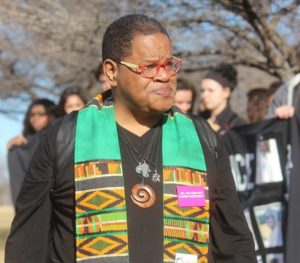This website uses cookies so that we can provide you with the best user experience possible. Cookie information is stored in your browser and performs functions such as recognising you when you return to our website and helping our team to understand which sections of the website you find most interesting and useful.
I Am Starr King: Interview with The Rev. Chris Long
 The Rev. Chris Long
The Rev. Chris Long
Graduate of SKSM, Class of 2009
Visiting Assistant Professor of Prophetic Practice
Administrative Program Specialist at the University of Wisconsin
What inspired you to become a religious leader?
The longer story is that I was born on April 24, 1968 in Memphis, Tennessee—20 days after Dr. King was killed. I was born into a family of social justice leaders—an amazing family of working class, working poor people, where I knew what social justice was by the ways we lived our lives. My family is also black Catholic, A.M.E. Zion, and black Baptist, which gave me to a robust understanding of the power of religion to transform injustice.
In my late 20s-early 30s, I knew there was more for me to do in this world. I had never heard of Starr King. However, being active as a young adult and in campus ministry in Madison, in Cleveland, Ohio, and at the UUA level, Unitarian Universalism provided an opportunity for me to deeply explore racial and social justice in a religious context that matched my family’s legacy and demand of me to live and work towards a better world. So I looked at both Meadville and Starr King. From the very beginning, I was deeply impacted by the welcome of Starr King, their personal approach to ministry and their ability to help me discern what it was I was supposed to be doing with my life.
Can you talk a little bit more about the work that you’re doing in your local communities?
In July of 2009, I moved back to Madison, WI, after being away since 2000 and was able to connect with community grassroots organizers working in the Hmong and African American communities around ending homelessness, education policy reform, prison reform and abolition, and to assist those who leave prison seeking to reenter their communities. Since July 2009, I have been building relationships with folks and it’s led to being a ministerial, pastoral presence with many who have left more traditional forms of religion or consider themselves spiritual or atheist. Through these relationships, we have been able to mobilize resources to challenge the racial disparities here, particularly after the murder of Tony Robinson on March 6, 2015. (Tony was a 19-year old African American who was killed by the police.)
That murder galvanized grassroots activists who are being led by the “Young Black and Gifted” movement (Madison’s Black Lives Matter movement) and others to end the racial disparities here in Madison. As you may know, Wisconsin has the worst racial disparities in the prison industrial complex in the entire country. Right now in Madison, local officials are criminalizing people and families who are homeless. Given this, I’m sitting on county committees looking at how to decrease the length of stay for people of color in our county jail system. Also as important to me is being in community relationships to support the activists in our community. Starr King has given me the tools to be with folks —whatever theology or non-theology they may hold— around trying to transform our world into a more whole place for everyone.
Why did you decide to teach at Starr King?
Teaching at Starr King is a continuation of my calling to be able to give back, particularly to Starr King, in ways that provide me with intellectual, theological and spiritual grounding—a calling which started through my family of origin in the late 1960s. To be present with students who seek to do ministries that are community based and who are developing and nurturing prophetic practice is what I hope to continue to offer. I often ask myself, “What does Starr King look like in the streets of our country and around the world—particularly in places that may have a huge liberal leaning but not a lot of spiritual or religious guidance to engage social justice and racial justice as a way of being?” I believe that by growing with students who are hungry and eager to practice their theologies in a variety of ways in the community, I can support Starr King and its ever-unfolding vision for this work.
What has been your most memorable or meaningful experience at Starr King?
My relationships with faculty, with the presidents of the school – current and recent past— and in particular with my relationships Dean of Faculty Gabriella Lettini and Provost Ibrahim Farajaje, who have supported my ministerial journey since I arrived at Starr King and up to today.
Additionally, some of the friendships I have formed with other peers during my time at Starr King have transformed my worldview and passion to live more fully into my life’s calling. Specifically, my soul level connections with Cile (Lucile) Beatty (MASC 2007), Rev. Sally Hamiln (M.Div 2008), and others have been critical to my religious, spiritual journey and to the self-care necessary as I journey.
Finally, I have little doubt that my Unitarian Universalist values and religious understanding are challenged and supported in being in relationships with folks connected to Starr King. May we all be forever challenged to ‘transform the world in the spirit of love’!
Want to share your story? Send your story to communications@sksm.edu.
